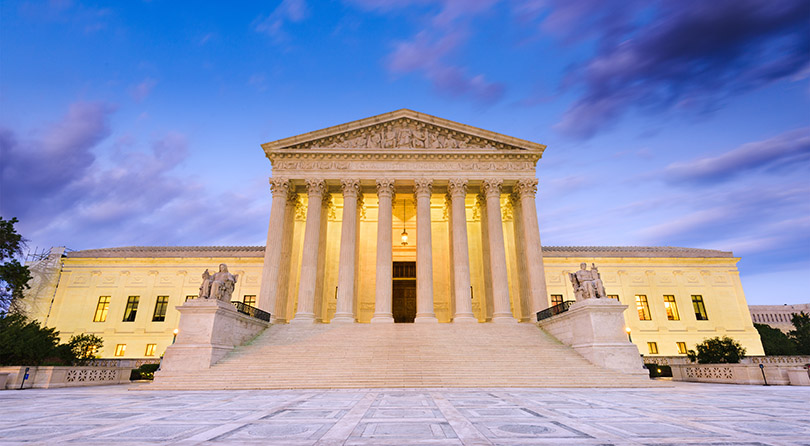![]()
On Thursday, June 17, the Supreme Court of the United States struck down the case that asserts the ACA is unconstitutional, without even ruling on the underlying argument.
In a landslide 7-2 vote, the ACA survived yet another legal challenge at the highest federal court. Supreme Court Justices Stephen Breyer, Clarence Thomas, Sonia Sotomayor, Elena Kagan, Brett Kavanaugh, and Amy Coney Barrett agreed with Chief Justice John Roberts to throw out the challenge to the healthcare law.
In explaining why, the Justices essentially said that Texas and the 17 other red states did not possess the “legal standing” to bring forth the case. Justice Stephen Breyer wrote on behalf of the majority opinion, “To have standing, a plaintiff must ‘allege personal injury fairly traceable to the defendant’s allegedly unlawful conduct and likely to be redressed by the requested relief,’ ” according to a post by NPR. “No plaintiff has shown such an injury ‘fairly traceable’ to the ‘allegedly unlawful conduct’ challenged here.”
As we recently wrote, there were three possible outcomes for the future of the ACA and the Court ruled to uphold the entirety of the healthcare law. Because the challenge was thrown out altogether, the Court did not weigh in on the constitutionality of the ACA without the Individual Mandate tax penalty, which made severability a moot point.
One potential downside with this outcome is that the fundamental argument around the constitutionality of the ACA without the Individual Mandate was not answered. This leaves the door open so to speak for possible legal arguments in the future. For the foreseeable future though, the ACA will rule supreme.
In an official statement released by the White House, President Joe Biden said, “Today’s decision affirms that the Affordable Care Act is stronger than ever, delivers for the American people, and gets us closer to fulfilling our moral obligation to ensure that, here in America, health care is a right and not a privilege.”
For the third time now, the ACA has been upheld as law of the land, solidifying its critical role in the infrastructure of U.S. healthcare and public health. And during a time when it is already receiving the greatest support it has seen since inception.
Over 31 million Americans have currently obtained healthcare coverage via the ACA. Based on enrollment data published by the Department of Health and Human Services (HHS), 11.3 million Americans have obtained coverage through the ACA marketplace; 14.8 million enrolled through Medicaid expansion; another 1 million obtained coverage through ACA Basic Health Programs; and nearly 4 million received coverage due to increased Medicaid promotional outreach efforts.
President Biden has made strengthening the ACA a top priority since taking office and so far, so good. In Biden’s American Rescue Plan, (ARP) significant advancements were made to the ACA including Premium Tax Credit (PTC) eligibility expansion, and reduced monthly premiums.
Specifically, the ARP allows Americans with income up to 150% of the Federal Poverty Line (FPL) to obtain ACA healthcare for $0 monthly premiums. It also allows Americans with income up to 400% and beyond the FPL to receive coverage for no more than 8.5% of their monthly household income.
Through a series of executive orders, Biden also created a special enrollment period, which has already garnered more than 1 million additional ACA signups. And more are expected to do so as the special enrollment period allows Americans to obtain coverage through August 15.
Biden’s ACA advancements are the beginning of an exciting time for healthcare in the U.S. With the ACA remaining law of the land, employers hoping for a repeal should revisit the requirements of the Employer Mandate, a portion of the law that necessitates the offer of certain healthcare coverage to full-time employees.
Under the ACA’s Employer Mandate, Applicable Large Employers (ALEs), which are employers with 50 or more full-time employees and full-time equivalent employees) are required to offer Minimum Essential Coverage (MEC) to at least 95% of their full-time workforce (and their dependents) whereby such coverage meets Minimum Value (MV) and is Affordable for the employee or be subject to Internal Revenue Code (IRC) Section 4980H penalties.
If your organization has been forgoing ACA compliance with the hope that the healthcare law and its employer requirements be struck down, now is the time to revisit your processes. The IRS is currently improving its efficiency for identifying ACA non-compliance and increased penalty assessments are imminent.
To learn best practices for complying with the Employer Mandate, including how to calculate ACA affordability, how to measure monthly compliance, and how to minimize IRS penalty risk, download the 2021 ACA Essential Guide for Employers.<





